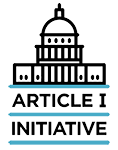Do you watch The Office? One of my favorite episodes is “Golden Ticket,” in which Michael Scott, taking cues from Willy Wonka, puts five golden tickets in different boxes of paper being shipped to customers to give them a special discount on future orders. Hijinks ensue, as Michael first gets a subordinate to take the blame when it seems the promotion goes awry but then insists the idea was his when it turns out to be a success. Explaining himself to a confused corporate executive, Michael says, “I will be honest with you. I do want the credit without any of the blame.”
Over at The Hill this past Saturday, Professor David Schoenbrod writes on how Congress has become the Michael Scott of our political system. In an era most perceive to be defined by increasing political polarization, there appears to be consensus on at least one major thing in Congress: bureaucrats, not legislators, should make big public policy decisions and have to deal with all the consequences and backlash that come with implementing those decisions. As Professor Schoenbrod writes, “[n]ot having to cast roll call votes on regulations makes life easier for members of Congress.” Legislators get to take credit for passing (vague) laws if the agency regulations are a hit, and they get to pass the blame onto the agency heads and ultimately the President if the American people don’t like what the agencies did. As Professor Schoenbrod details, Republicans and Democrats share in the blame for the dysfunctional status quo, notwithstanding attempts at window dressing by both sides to make it seem like the other is at fault. Professor Schoenbrod notes how this unfortunate bipartisan consensus creates a “regulatory mess” and exacerbates polarization. If agencies are going to be making the law anyway, then legislators are free to take uncompromising stances for show rather than work together to do their constitutional duty. As he suggests, the American people would be better served if our elected representatives would make hard choices and answer directly for them rather than act as if they are doing something while shirking responsibility and dodging accountability all the while.
Sponsors
Administrative Law and Regulation Practice Group

 Joel S. Nolette
Joel S. Nolette 